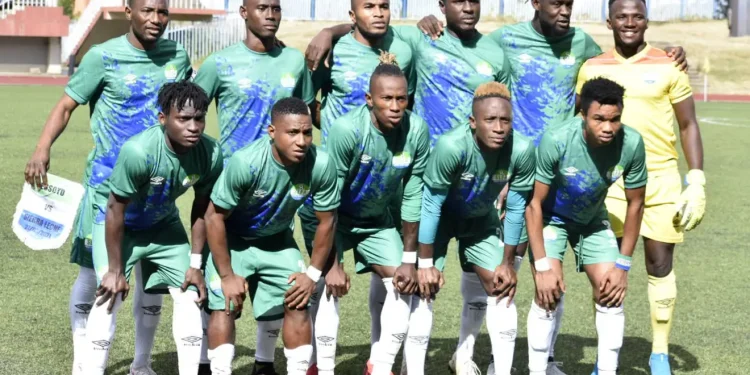By Hassan Osman Kargbo
Sierra Leone’s national football team, affectionately known as the Leone Stars, has long been a symbol of hope, pride, and resilience for the nation. From the vibrant streets of Freetown to the rural villages, football has united the people, fostering a sense of national identity and collective ambition.
However, despite the talent that often shines through, the team has faced significant setbacks on the continental stage, most recently failing to qualify for the Africa Cup of Nations (AFCON). This failure has sparked widespread disappointment, but more importantly, it has prompted a critical examination of the systemic issues plaguing Sierra Leonean football.
Former Leone Stars manager, Mr. Babadi Kamara, recently shared his candid thoughts on these issues in an interview on the 98.1 Good Morning Salone program. Kamara, who has been intimately involved with the team, expressed concerns that go far beyond the mere on-field performance of the players. His remarks shine a spotlight on the deep-rooted administrative and developmental shortcomings that continue to hinder the national team’s success.
One of the central issues raised by Kamara is the absence of a cohesive and forward-thinking strategy for football in Sierra Leone. Football, he argues, is not just about raw talent; it is a structured, long-term development process. Unfortunately, the Leone Stars have not benefitted from such an approach. According to Kamara, the lack of proper player scouting, insufficient investment in grassroots football, and the absence of a clear long-term plan are major contributing factors to the team’s struggles.
At the heart of these issues is the failure of the national football administration to nurture young talent and provide a roadmap for their progression. In an era when many African nations are ramping up investments in their football programs, Sierra Leone remains stuck in a cycle of short-term solutions, which ultimately limits its growth and potential.
Kamara further lamented the current state of player management within the national team. A crucial aspect of any successful football team is a unified training regime, but the Leone Stars have consistently lacked such coordination. Many players arrive for national duty without adequate preparation, often having faced various challenges in their respective clubs. This inconsistency in player fitness and preparation means that, when they come together as a national team, they are often unfit to compete at the highest level.
The physical preparation of players is not the only concern; mental well-being plays a pivotal role in a team’s performance. Kamara pointed out that there is a significant gap in psychological support for the players. Representing one’s nation comes with immense pressure, and without proper mental health resources, players can struggle to cope with the expectations placed upon them. In an increasingly competitive football landscape, mental resilience is just as important as physical prowess. Thus, the absence of a structured mental health framework for the Leone Stars can result in a demoralized squad, unable to perform when it matters most.
Another critical issue highlighted by Kamara is the lack of coordination between the national football federation and local clubs. Many players, particularly those based abroad, juggle demanding club schedules with national team obligations. This often leads to burnout or injury, with players unable to give their best when they finally join the national team.
A more structured approach to international and club fixtures is needed to ensure players can maintain peak performance levels without compromising their well-being. It is vital that the national team and clubs work together to create a calendar that accommodates both sets of responsibilities, ultimately benefiting the players and the country. A well-coordinated fixture list would also allow the Leone Stars to build a more cohesive squad, as players would have more time to train and gel together as a unit.
Kamara’s concerns also extend to the local football scene. Sierra Leone’s domestic leagues are often underfunded and lack the infrastructure required to nurture the next generation of talent. Without a flourishing league, players often seek opportunities abroad, where they can develop their skills in more competitive environments. While this can be beneficial for individual growth, it creates a disconnect between the players and the national team when they return, leading to gaps in skill and experience.
To address this, Kamara calls for greater investment in the domestic leagues. The government, in partnership with the football federation and private stakeholders, must create an ecosystem that encourages the growth of local clubs. This includes providing financial support, improving facilities, and ensuring that clubs are able to scout and develop young talent from a young age. A strong domestic league is the foundation upon which a successful national team can be built.
The failure to qualify for the AFCON is more than just a disappointment—it is a stark reminder of the deeper challenges that Sierra Leonean football faces. As Kamara pointed out, the Leone Stars’ struggles are symptomatic of broader issues that have been allowed to fester within the footballing infrastructure of the country.
To overcome these challenges, there needs to be a unified approach to reforming football in Sierra Leone. This requires a collective effort from the government, the football federation, the clubs, and the players themselves. Only through a shared vision and a commitment to long-term development can the Leone Stars hope to regain their position among Africa’s footballing elite.
The time for complacency is over. It is time for all stakeholders to come together and create a sustainable framework for Sierra Leonean football. By investing in player development, improving the mental and physical well-being of the athletes, and fostering a vibrant domestic league, Sierra Leone can build a stronger footballing future. With unity, vision, and a commitment to change, the Leone Stars can once again rise to the occasion and inspire the nation.











